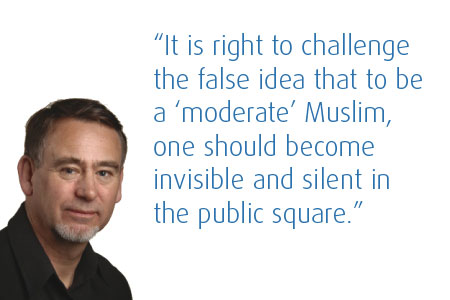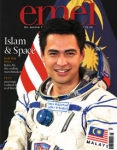
Living up to Shared Values - Jeremy Henzell-Thomas
Issue 80 May 2011
We should join forces to fight social decay and not bring each other down for ethnic or nationalistic superiority.
In a previous essay for this column (“Coming Home to the Land,” May 2010) I reflected on why I had decided to return to England after living for four years in the French countryside. It turned out to be the right decision in many ways, not least because we are now blessed with nine grandchildren on English soil. I had also explained that apart from the obvious pull of our growing family, including the needs of elderly parents, I had realised that my emotional roots were firmly planted in the English landscape, and that I could not feel that connection of the ‘soul’ to rural France.
It was very clear to me at the time that I had not been impelled to return to England by the allure of core “British values” which had become so politicised, and which, sadly, have been more recently invoked as weapons in an ideological war on multiculturalism. Such values, usually taken to include freedom, liberal democracy, tolerance, and equality, are, in any case, pretty well indistinguishable from the “Western values” or broadly human values which ideally inform our “way of life.” In any case, the heart goes deeper than abstract principles. It was the family and the land I came home to, and it is the beloved land I now walk again.
As I wrote at that time, I believe we should always be very wary of misappropriating universal human values for the jingoistic and smugly ethnocentric purpose of national superiority. Instead of colonising core values for the purpose of asserting tribal superiority, we should all, no matter what our affiliation, be working together to reclaim those shared universal principles and core human values which transcend national, cultural, ideological and religious divides. Islam, after all, came to abolish a tribal mentality.
Just as I am wary of reducing the universality of shared human values to a distinctive national identity, by the same token I personally try to avoid referring to myself as a ‘convert’ to Islam, because the word ‘convert’ can often be taken to express some kind of shift in allegiance — leaving one tribe or cultural milieu and joining another, and my becoming a Muslim had nothing to do with that. Islam, for me, is not a tribe or a culture, but a set of universal principles; a way of knowing, being and living which guides us to a comprehensive vision of what it means to be a human being. It is, for me, not a sudden espousal of that vision, not a Road to Damascus experience, not a rejection of everything I was before, but the positive culmination of a long and apparently circuitous journey which took 50 years; a destination which does not sever threads, but draws them all together. Tawhid is a vision of unity, not of severance, fragmentation or partisanship.
Neither would I call myself a ‘revert’, the term favoured by some converts. To the claim that the Qur’an allegedly asserts that “Everyone is born a Muslim,” and that I have simply “reverted” to the True Faith — to my knowledge the Qur’an does not say this, and neither did the Prophet Muhammad. Muhammad Asad points out that the word islam means ‘self-surrender to God’: and it is in this primary sense that the terms islam and muslim are used throughout the Qur’an. Similarly, the Prophet did not say that everyone is born a Muslim, but that everyone is born into a state of fitrah, and thus shares an essential nature or primordial disposition with all the children of Adam.
But I am aware of a paradox. Affirming the universality of shared human values is not to say that I do not recognise that there may be something distinctive in the British ‘temper’ or character which draws on our unique historical and cultural experience and which provides us with a narrative that can inspire us to reach for human excellence. Various qualities are typically associated with that temper, including fairness, decency, moderation (and the related virtue of modesty), balance (and its expression in the national genius for pragmatic compromise), civility, reserve, self-restraint, and stoicism, that very British unflappability and equanimity — keeping calm and carrying on, the ‘stiff upper lip’.
Many of these converge in a remarkable way with what I understand to be Islamic principles and values: for example, moderation with the Qur’anic vision of Muslims as a “community of the middle way”; civility with adab (correct behaviour), and stoicism with sabr (patient endurance). I don’t know if we would want to go so far as to agree with the Duchess of Devonshire, who has recently lamented the decline of the British stiff upper lip, claiming that we now have, in her words, a “sloppy, sentimental culture of self-pity and self-esteem.” But we might still want to admire the archetypal British unflappability shown at the Battle of Waterloo, when in the heat of battle the Duke of Uxbridge turned to the Duke of Wellington and said, “By God, sir, I’ve lost my leg!” to which Wellington impassively replied, “By God, sir, so you have.”
As for modesty, the Prophet Muhammad is reported to have said, “Every religion has a distinctive feature and the distinctive feature of Islam is modesty,” and “True modesty is the source of all virtues.” The English words ‘fairness’ and ‘decency’ both derive from roots which have the sense of ‘fitting’ or ‘proportionate’, and therefore converge beautifully with one of the underlying senses of the concept of justice (‘adl) in Islam. The word ‘decency’ is directly related to the words ‘dignity’ and ‘decorum’, showing how such virtues have a simultaneously ethical and aesthetic dimension in exactly the same way as the concept of excellence (ihsan) in Islamic tradition refers to both goodness and beauty.
Balance and moderation, however, should not be equated with half-heartedness, expediency or mediocrity. It is right to challenge the false idea that to be a ‘moderate’ Muslim, a ‘good’, conforming Muslim, one should become invisible and silent in the public square. We have in Britain an honourable tradition of reforming liberalism, social activism and peaceful, intelligent, legitimate dissent that has historically guided our national evolution towards a free, just and tolerant society. We should not forget that civic engagement cannot be defined solely as conformity to any politically motivated agenda, and that our system of procedural secularism gives Muslims as much right as any other citizen to speak up for political, social and economic justice without fear of being stigmatised.
As a British Muslim, I regard my ‘multiple identity’ not as a source of conflict between values, but as a precious gift which helps me to live by those beautiful verses in the Qur’an which sanction diversity as a positive human condition that has been divinely ordained. My identity as a Muslim is not in conflict with my identity as a human being, and some of my cherished human values may find expression in other parts of my identity which I see as English, Welsh or British. All these multiple layers of identity can vie with one another, support each other, and hold each other to account, and each one can help us to see what needs to be reclaimed and revived, for all of us are confronted in these times of social decay with an urgent need to renew the best in our respective traditions.
Above all, whatever values we claim for ourselves, we have to live up to them, and even more so if we preach about them to others. If “freedom and democracy” are touted as core British values, we have every right to ask how these values are consistent with the supply of arms and ‘security equipment’ to tyrannical regimes. If “equality” is also held up as one of those values, as it usually is, we might question why the divisions between the rich and poor in Britain are wider now than 40 years ago and how it is that the richest 10% are more than 100 times as wealthy as the poorest 10%. Similarly, if governments uphold “responsibility for others” as integral to our “way of life,” we might well ask why Britain is ranked so low amongst developed nations in child welfare and care for the elderly. Care for the most vulnerable is surely the clearest expression of social responsibility, and yet the vast majority of elderly people in our hospitals do not receive the basic standards of care and respect to ensure human dignity. We might be even more shocked to learn that nine out of ten people with learning difficulties have been abused or bullied, sometimes with fatal consequences.
And of course, the same process of ‘holding to account’ applies equally to Islamic values. It is all very well for religious scholars to hide behind the Islamic ideal of equality for women by quoting apposite verses and Prophetic traditions, but as Tariq Ramadan has observed, any objective look at Muslim communities, whether in the east or the west, will reveal that the reality is very different from the ideal, “and to say otherwise would be a lie.”
The real debate to be had is not the bogus clash of civilisations and values, whether ‘east’ or ‘west’, ‘religious’ or ‘secular’, ‘traditional’ or ‘progressive’, ‘British values ’or ‘the values of others’, but the stark choice between renewal or decay, and that applies to every civilisation at all times.
Bookmark this |
|
Add to DIGG |
|
Add to del.icio.us |
|
Stumble this |
|
Share on Facebook |
|
Share this |
|
Send to a Friend |
|
Link to this |
|
Printer Friendly |
|
Print in plain text |
|


Comments
1 Comment
1
Chris Bailey
25 Jun 11, 20:05
You have travelled a long way since we studied Blake and I should enjoy catching up with you - Chris Bailey